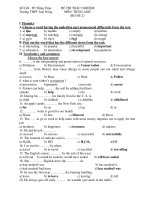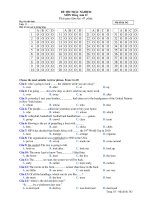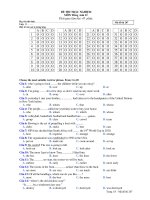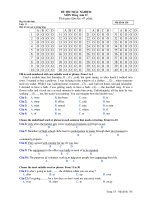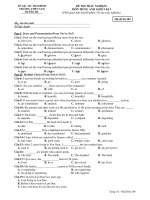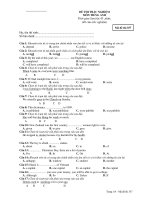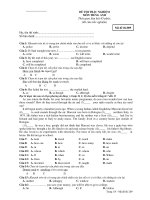ĐỀ THI TRẮC NGHIỆM MÔN: TIẾNG ANH (BỘ ĐỀ 2) docx
Bạn đang xem bản rút gọn của tài liệu. Xem và tải ngay bản đầy đủ của tài liệu tại đây (81.79 KB, 4 trang )
SỞ GD - ĐT Đồng Tháp ĐỀ THI TRẮC NGHIỆM
Trường THPT Tam Nông MÔN: TIẾNG ANH
(BỘ ĐỀ 2)
I. Phontics:
A.Choose a word having the underline part pronounced differently from the rest.
1. a) line b) middle c) satisfy d) kitchen
2. a) enjoyed b) watched c) stopped d) cooked
3. a) gave b) slave c) hat d) escape
B. Pick out the word that has the different stress from the rest:
4. a) interesting b) popular c) beautiful d) important
5. a) education b) internation c) development d) population
II. Vocabulary and grammar:
Choose the best answer
6. ……… is the safeguarding and preservation of natural resources.
a) Pollution b) Environment c) Conservation d) Conversation
7. ……… from flowers may cause allergy to some people can not stand and strange
smell.
a) Leaves b) Root c) Plant d) Pollen
8. what is your father’s occupation ?
a) possession b)property c) poverty d) career
9. Farmer can help……… the soil by adding fertilizers.
a)make b) help c) do d) work
10. During his ……… , his family lived in the U. S. A.
a) child b) childish c) childlike d) childhood
11. An apple stands………… the New York city.
a) for b) on c) up d) at
12…………. water is good for our health.
a) Waste b) Sea c) Mineral d) River
13. The…… to go to work to help mum with some money impulses me to apply for that
job.
a) tiredness b) happiness c) keenness d) sadness
14. He did his job …………
a) succeed b) success c) successful d) successfully
15. The formula of carbonic acid is …………
a) H
2
SO
4
b) HCl c) H
2
CO
3
d)HF
16. I
’
m used to………. by plane.
a) travel b) to travel c) travelled d) travelling
17. The English course ……… by the end of this year.
a) will end b) would be ended c) would have ended d) will have ended
18. She…………. English since she …………six
a) had studied/ was b) has studied/ is
c) had studied/ had been d) has studied/ was
19. he was the first man …………. the burning building.
a) leave b) to leave c) leaving d) left
20. He always gets off early………. he wouldn
’
t get stuck in the traffic .
a) because b) so that c) although d) in case
21. Charlie Chaplin , ………. a comedian , was best known for his work in silent movies.
a) who b) which c) whose d) that
22. Look! The bus ………….
a) is coming b) will be coming
c) was coming d) had been coming
23. “ We had someone paint our house” means………….
a) We had our house to paint. b) We had our house painted.
c) Our house had been painted. d) Our house had been painted by us
24. The film was ……. interesting that I wanted to see it again.
a) so b) such c) too d) very
25. She didn’t say a word and left the room.
a) She left the room without saying a word.
b) She leaving the room without saying a word.
c) She left the room saying a word.
d) She left the room to say a word.
III. Writing:
A. Identify the one underlined word or phrase that must be changed to make the
sentence correct:
26. After Jonh eaten dinner, he wrote several letters and went to bed.
a b c d
27. Because they had spent too many time considering the new contract, the students
a b c
lost the opportunity to lease the apartment.
d
28. Never she has complained about her toothache.
a b c d
29. Mother’s Day is the day when children show their love to their mother on.
a b c d
30. We are not used to drive on the left side of the road.
a b c d
B. Choose the correct phrase or clause to complete each of the following sentence:
31. Nam was the first man ………… yesterday.
a) to be interviewed
b) who was interviewed
c) interviewing d) a and b are correct
32. “ If I were you, I would stop smoking”. Nam said to me.
…………………………………
a) Nam advised me to smoke. b) Nam advised me to stop to smoke.
c) Nam advised me to stop smoking. d) a and b are correct
33. “The film is so interesting that I’ve seen it twice.” means ……………
a) The film is enough interesting for me to have seen twice.
b) It is such an interesting film that I’ve seen it twice.
c) The film is interesting enough for me to have seen it twice.
d) This film is too bad for me to have seen twice.
34. “ I do not know English.” means ……………….
a) I can speak English. b) I have some good knowledge of English.
c) I have no knowledge of English. d) I can speak English very well.
35. Ba has spent ………… time and money on stamp collecting.
a) a few of b) many of c) a lagre number of d) a great deal of
IV. Reading:
A. Reading the text and choose the correct answer to each question:
Scientists claim that air pollution causes a decline in the world's
average air
temperature. in order to prove that theory, ecologists have turned to historical data
relation to especially huge volcanic eruption. They suspected that volcanoes affect
weather changes that are similar to air pollution.
One source of information is the effect of the eruption of Tambora, a volcano in
Sumbawa, the Dutch East Indies, in April 1815. The largest recorded volcanic eruption,
Tambawa threw 150 tons of fine ash into the stratosphere. The ash from volcano spreads
worldwide in a few days and remains in the air for years . Its effect is to turn into
incoming solar radiation into space and thus cools the earth . For example , records of
weather in England show that between April and November 1815 , the average
temperature had fallen 4.5
0
F . During the next twenty - four months , England suffered
one of the coldest periods of its history. Farmers
’
records from April 1815 to December
1818 indicate frost throughout the spring and summer and sharp decreases in crop and
livestock markets . Since there was a time lag of several years between cause and effect,
by the time the world agricultural commodity community had deteriorated, no one
realized the cause.
Ecologists today warn that we face a twofold menace. The everpresent possibility
of volcanic eruptions, such as that of Mt. St. Helens in Washington, added to man’s
pollution of the atmosphere with oil, gas, coal, and other polluting subtances, may bring
us increasingly coal weather.
1. It is believed that the earth gets colder when ………
a) volcanors erupt. b) the earth is polluted by modern man.
c) the rays of the sun are turned into space. d) all of the above.
2. The effects of Tombora’s eruption were ……….
a) felt mainly in the Dutch East Indies.
b) of several days’ duration worldwide.
c) evidence of pollution’s cooling the earth.
d) immediately evident to the world’s scientists.
3. The cause of cold weather in England from 1815 to 1918 was …………
a) decreased crope and livestock production. b) volcanic ash in the atmosphere.
c) pollution caused by the Industrial Revolution. d) its proximity to the North sea.
4) No one realised the cause of deterioration of the world agricultural commodity
market because …….
a) there was a long delay between cause and effect.
b) the weather is beyond our comprehension.
c) weather forecasts were inaccurate.
d) ecologists did not exist until modern time.
5) If, as some scientists predict, the world ends in ice, what might be the cause?
a) modern man’s pollution of the air. b) volcanic eruptions
c) obliteration of solar radiation. d) all of the above.
B. Choose the best answer for each number blank:
Water is our life source. It makes up 70 per cent of (1)…… bodies, and the
average person actually spends 18 months of his life (2)………. the bath or shower.
But we are only now learning how to look (3)……… water. Acid rain (4)……
polluted the air as many as 18,000 lakes and our seas and rivers are polluted with waste
products. It is now (5)…… expensive to try to repair the damage which has been done.
We have some hope for the future, though, (6)……… new sources of water have been
discovered. People (7)………. in the Sahara Desert have (8)…… fish swimming in
deep underground stream. Scientists also believe (9)……… is a huge lake underneath
London. If we have (10)……… anything from our mistakes, we will try to keep these
new areas of water clean.
1. a) the b) their c) our d) these
2. a) in b) to c) on d) at
3. a) over b) on c)after d)to
4. a)will b) has c) would d)is
5. a) very b) such c) more d) much
6. a)which b) because c) so d)even
7. a) live b) living c) lives d) lived
8. a) realized b) put c) looked d)found
9. a)it b) here c) that d) there
10. a) taught b) practised c) seen d) learnt
Đáp án là phần in đậm
